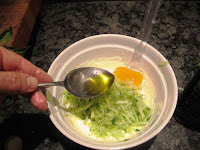This is not exactly a fast dish, but one well worth the effort. I found a number of Greek stifatho recipes that use meat, beef, rabbit, hare, etc, but the suggestions to use mushrooms came from a cookery book with Middle Eastern vegetarian dishes although that version was not quite as daring on the spices front, leaving them out except for salt and pepper and substituting sugar for honey. In some recipes there is also the suggestion to use orange zest (to be removed before serving). Sadly, I didn’t have any oranges, but my sense of imagined taste tells me that it would seem well worth the effort. Like all stews it tastes just as good or even better warmed up, so it is a good bet for guests as you can do it in advance.
What you need
- 500 gr mushrooms of various kinds (I used button mushrooms and chanterelles) cut into mouth-sized pieces (smaller if mouth sizes are big…)
- 500 gr shallots or small onions peeled
- 1 red pepper, diced
- 5-8 cloves of garlic
- 5-7 cm cinnamon stick
- 6 tbsp good vinegar
- 150 ml red wine (we didn’t because of our Afghan guest and friend)
- 1-2 tsp coriander powder
- 1-2 tsp cumin powder
- 5 cloves or a 1 tsp of clove powder
- 400 g diced tomatoes, passata or tinned (not pictured)
- 1-2 good tbsp. tomato purée
- 1 medium tbsp honey
- dried oregano
- salt and pepper to taste

 What you do
What you do
- Fry the mushrooms in olive oil till they take colour, season with part of the garlic crushed, salt and pepper.
- Add the pepper and continue to sauté until the desired level of tenderness in the pepper is reached. Put aside for adding to the stew later unless you don’t mind limp mushrooms and pepper.
- Sauté the shallots/onions in generous olive oil until they begin to brown, then add the remaining cloves of garlic, whole or halfed.(about 10 mins).
-
Add the spices and
stir until they begin to brown as well. (Sorry about the picture quality)
At this point you can stir in the mushrooms and the pepper. (alternatively see last point) - Pour in the vinegar and wine, if using, otherwise add a little water and the honey.
- Add the tomato and the tomato paste, the oregano and the honey and leave to simmer for as long "as you can" (an hour is actually a good start) The mixture should just about cover the bits already in the pan.
- Mix in the mushrooms and peppers about 5 minutes before serving (unless you go for the option of adding them to the onions) and leave to simmer until everything is heated through.
I serve this with
roast rosemary potatoes, potatoes cut into wedges, roasting in a baking tin
with plenty of olive oil and some sprigs of rosemary, seasoned with sea salt
and more crushed garlic, turned occasionally. Easy and really rather tasty.



.JPG)












